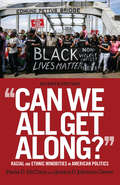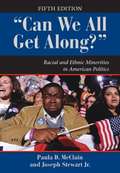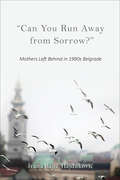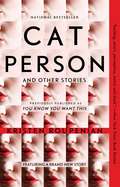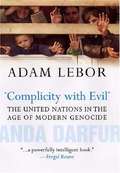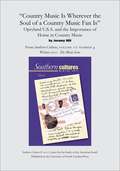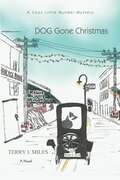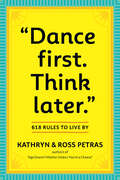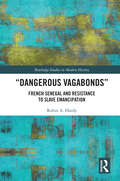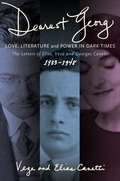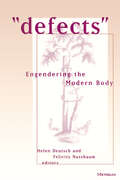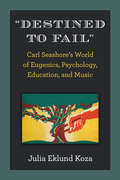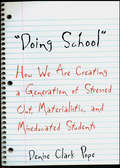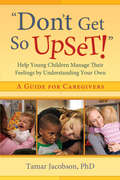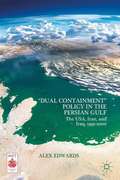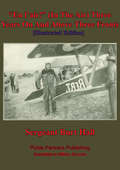- Table View
- List View
"Can We All Get Along?": Racial and Ethnic Minorities in American Politics
by Paula D. Mcclain Jessica CarewIn a nation built by immigrants and bedeviled by the history and legacy of slavery and discrimination, how do we, as Americans, reconcile a commitment to equality and freedom with persistent inequality and discrimination? And what can we do about it? This widely acclaimed text by Paula D. McClain, with new coauthor Jessica D. Johnson Carew, provides a comprehensive and accessible overview of the historical and contemporary political experience of the major groups-African Americans, Latinos, Asian Americans, and American Indians-in the United States. It explores the similarities and differences in these groups' representation and participation in law, politics, and policymaking, discusses the enduring issues and concerns that they face, and examines intra- and inter-group competition and coalition-building in the face of enduring conflict and inequality. The seventh edition has been thoroughly revised and updated to include coverage of President Barack Obama's second term, the 2016 election, police brutality and Black Lives Matter, and the Dakota Access Pipeline protest movement. With a brand-new chapter on the intersections of race and gender, "Can We All Get Along?" remains unparalleled in its comparative coverage of the current landscape of minority politics in the United States.
"Can We All Get Along?": Racial and Ethnic Minorities in American Politics (5th Revised Edition)
by Joseph Stewart Paula D. Mcclain Jr.In a nation built by immigrants and bedeviled by the history and legacy of slavery and discrimination, issues of liberty, equality, and community continue to challenge Americans. <P><P>In the fifth edition of this widely acclaimed text, Paula McClain and Joseph Stewart combine traditional elements of political science analysis--history, Constitutional theory, institutions, political behavior, and policy actors--with a fully updated survey of the political status of four major groups: blacks, Latinos, Asian Americans, and American Indians. McClain and Stewart show similarities and differences in these groups' political action and experience, and point the way toward coalition, competition, and consensus building in the face of ongoing conflict. Two dilemmas shape the book: How do we as a nation reconcile a commitment to equality with persistent inequality and discrimination? And what can we do about it--from the perspective of ethnic and racial minorities as well as within the dominant culture? Thoroughly updated following the historic 2008 presidential election, this new edition provides a concise overview of minority politics in America.
"Can You Run Away from Sorrow?": Mothers Left Behind in 1990s Belgrade (New Anthropologies Of Europe Ser.)
by Ivana Bajic-HajdukovicThis intimate social history of family life in 1990s Serbia considers how emigration effects the elders left behind.The fall of Yugoslavia in the 1990s led citizens to look for better, more stable lives elsewhere. For the older generations, however, this wasn’t an option. In this powerful work, Ivana Bajic-Hajdukovic reveals the impact that waves of emigration from Serbia had on family relationships and, in particular, on elderly mothers who stayed.With nowhere to go, and any savings given to their children to help establish new lives, these seniors faced a crumbling economy, waves of refugees entered from Croatia and Bosnia-Herzegovina, NATO bombings, and the trial and ouster of Slobodan Milosevic. Bajic-Hajdukovic explores the transformations of family relationships and daily life practices in people’s homes, from foodways and childcare to gift exchanges.“Can You Run Away from Sorrow?” illustrates not only the tremendous sacrifice of parents, but also their profound sense of loss—of their families, their country, their stability and dignity, and most importantly, of their own identity and hope for what they thought their future would be.
"Cat Person" and Other Stories: Cat Person And Other Stories
by Kristen Roupenian*Includes the story &“Cat Person&”—now a major film* A compulsively readable collection of short stories that explore the complex—and often darkly funny—connections between gender, sex, and power across genres. &“These stories are sharp and perverse, dark and bizarre, unrelenting and utterly bananas. I love them so, so much.&” —Carmen Maria Machado, National Book Award Finalist and author of Her Body and Other Parties &“Kristen Roupenian isn&’t just an uncannily great writer, she also knows things about the human psyche…The world has made a lot more sense since reading this book.&” —Miranda July, New York Times bestselling authorPreviously published as You Know You Want This, &“Cat Person&” and Other Stories brilliantly explores the ways in which women are horrifying as much as it captures the horrors that are done to them. Among its pages are a couple who becomes obsessed with their friend hearing them have sex, then seeing them have sex…until they can&’t have sex without him; a ten-year-old whose birthday party takes a sinister turn when she wishes for &“something mean&”; a woman who finds a book of spells half hidden at the library and summons her heart&’s desire: a nameless, naked man; and a self-proclaimed &“biter&” who dreams of sneaking up behind and sinking her teeth into a green-eyed, long-haired, pink-cheeked coworker. Spanning a range of genres and topics—from the mundane to the murderous and supernatural—these are stories about sex and punishment, guilt and anger, the pleasure and terror of inflicting and experiencing pain. These stories fascinate and repel, revolt and arouse, scare and delight in equal measure. And, as a collection, they point a finger at you, daring you to feel uncomfortable—or worse, understood—as if to say, &“You want this, right? You know you want this.&”
"Cause Unknown": The Epidemic of Sudden Deaths in 2021 & 2022 (Children’s Health Defense)
by Ed DowdWhat is killing young healthy Americans? Edward Dowd, a former Wall Street analyst and BlackRock portfolio manager, examines the epidemic of sudden deaths in America. Throughout his stock picking career, he utilized pattern recognition to get ahead of his peers and the street before his bullish or bearish thesis became consensus. Early in 2021, he noticed a rise of news anecdotes about sudden deaths among very fit athletes and other seemingly healthy young people across the country. His thesis was simple: What changed in 2021? . . . A mass vaccination campaign for Covid-19 was his conclusion. Over the course of 2021 and 2022, Edward amassed evidence from the insurance industry, funeral home industry, and government databases that excessive deaths among working-age Americans have increased in 2021 versus 2020 when vaccines were not available. This book will introduce you to some of the tragic stories that have occurred the last eighteen months and lay out the metadata to show readers that something profound changed in 2021 to cause the sudden rash of young deaths with Cause Unknown!
"Clar n Lies!": Bias, Post-Truth, and Populism in Argentina's Media War
by Rafael Di Tella Jose Liberti Sarah McAraIn 2012, Argentine media conglomerate Grupo Clar n and President Cristina Fern ndez de Kirchner were embroiled in what some called "the mother of all battles." Grupo Clar n was one of the preeminent media companies in Argentina, with leading newspapers, cable television and Internet services, and broadcast television and radio stations. Some critics contended the company had prospered over several decades by managing relationships with governments of varying political color, such as with N stor Kirchner (2003-2007), the popular president who helped lead the country out of the financial crisis. But its relationship with the government changed in 2008 when a divisive agricultural export tax sparked a conflict between Grupo Clar n and President Cristina Kirchner, N stor Kirchner's wife and successor. Then in 2009, in a call for "democratizing" the media, Cristina Kirchner introduced a media reform law that would significantly limit Grupo Clar n's operations. By 2012, the conglomerate had delayed the law's implementation through the courts, but would likely have to restructure to accommodate the new regulatory environment. The case allows students to consider the assumptions that underlie media regulation and to debate the role of media in society. It may also be used to discuss how to evaluate a business decision in an uncertain regulatory environment.
"Clar n Lies!": Bias, Post-Truth, and Populism in Argentina's Media War
by Rafael Di Tella Jose Liberti Sarah McAraIn 2012, Argentine media conglomerate Grupo Clar n and President Cristina Fern ndez de Kirchner were embroiled in what some called "the mother of all battles." Grupo Clar n was one of the preeminent media companies in Argentina, with leading newspapers, cable television and Internet services, and broadcast television and radio stations. Some critics contended the company had prospered over several decades by managing relationships with governments of varying political color, such as with N stor Kirchner (2003-2007), the popular president who helped lead the country out of the financial crisis. But its relationship with the government changed in 2008 when a divisive agricultural export tax sparked a conflict between Grupo Clar n and President Cristina Kirchner, N stor Kirchner's wife and successor. Then in 2009, in a call for "democratizing" the media, Cristina Kirchner introduced a media reform law that would significantly limit Grupo Clar n's operations. By 2012, the conglomerate had delayed the law's implementation through the courts, but would likely have to restructure to accommodate the new regulatory environment. The case allows students to consider the assumptions that underlie media regulation and to debate the role of media in society. It may also be used to discuss how to evaluate a business decision in an uncertain regulatory environment.
"Complicity With Evil": The United Nations in the Age of Modern Genocide
by Adam LeborFrom the killing fields of Rwanda and Srebrenica a decade ago to those of Darfur today, the United Nations has repeatedly failed to confront genocide. This is evinced, author and journalist Adam LeBor maintains, in a May 1995 document from Yasushi Akashi, the most senior UN official in the field during the Yugoslav wars, in which he refused to authorize air strikes against the Serbs for fear they would "weaken" Milosevic. More recently, in 2003, urgent reports from UN officials in the Sudan detailing atrocities from Darfur were ignored for a year because they were politically inconvenient. This book is the first to examine in detail the crucial role of the Secretariat, its relationship with the Security Council, and the failure of UN officials themselves to confront genocide. LeBor argues the UN must return to its founding principles, take a moral stand and set the agenda of the Security Council instead of merely following the lead of the great powers. LeBor draws on dozens of firsthand interviews with UN officials, current and former, and such international diplomats as Madeleine Albright, Richard Holbrooke, Douglas Hurd, and David Owen. This book will set the terms for discussion when UN Secretary General Kofi Annan steps down to make room for a new head of the world body, and political observers assess Annan's legacy and look to the future of the world organization.
"Country Music is Wherever the Soul of a Country Music Fan Is": Opryland U.S.A. and the Importance of Home in Country Music
by Jeremy HillNixon's visit (only five months before his resignation) was seen by national journalists and politicos to be a trip to one of the few places where he would still receive a warm reception, and it was quite warm indeed. Nixon took the stage, played two songs on the piano, and bantered with Roy Acuff."When the Opry changed sites it wasn't without a good deal of growing pains, angst, and rhetoric--but by taking old values to the new venue, not to mention a circle of the original old floor, country music survived the switch.This article appears in the 2011 Music issue of Southern Cultures.Southern Cultures is published quarterly (spring, summer, fall, winter) by the University of North Carolina Press. The journal is sponsored by the University of North Carolina at Chapel Hill's Center for the Study of the American South.
"DAWGS!": An Anthology of Stories About Them
by Charles Wright GrayShort story collection by famous authors such as D. H. Lawrence, Booth Tarkington, O. Henry, Albert Payson Terhune, Don Marquis and Max Brand, as well as less well-known. Stories show their times with some being violent and Definitely Not pc. Not for the tender hearted with the exception of 4 or so.
"DOG Gone Christmas": A Cozy Little Murder Mystery
by Terry I. MilesSeven years ago the housekeeper, Maudelle Perkins, found Horace Fletcher, Director of Shady Rest Funeral Home, dead at his desk. Cyrus Dedeaux, one of three morticians hired by Mr. and Mrs. Fletcher, was declared guilty. However, new DNA evidence, presented by his lawyer, had proven Mr. Dedeaux innocent and he has been set free! Three days after Cyrus returned, there has been an alleged attempted murder on Rose Fletcher, Horace's widow, and a body has washed up on the beach. Before attending the gala benefit honoring environmentalist, Dr. Horatio Banks, in Bay St. Louis, Mississippi, Mrs. Julia McKenna and her boyfriend, Captain Eric VonBoatner, are supposed to pick up a 1927 Model T. Ford, which she won two months earlier in a drawing. During an impromptu shopping spree, Aunt Jewels and a dog named Maggie May are kidnapped and dog napped respectively. Upon inspection of the floorboards inside of the antique car, her niece, Private Investigator Bea Winslow, discovers small specks of dried blood. Mystery, mayhem and merriment, follow these two sleuths as they weave their humor, crime solving tactics and hilarious antics, through a host of unsavory characters, the funeral parlor, saving the environment, Christmas festivities in the Bay and finding Aunt Jewels and Maggie May.
"Dance First. Think Later": 618 Rules to Live By
by Ross Petras Kathryn PetrasTimeless in their wisdom, thought-provoking in their message, surprising in their truth and memorable in their originality, the right words can give direction, inspiration, and sometimes a tangible boost onto the right path. For example, Steve Jobs once read “Stay hungry Stay foolish” on the back cover of The Whole Earth Catalog, and those four words came to guide his life. Created by Kathryn and Ross Petras, connoisseurs of quotes, whose books and calendars have over 56 million copies in print, "Dance First. Think Later." is a collection of the greatest life wisdom from an unexpected group of speakers, doers, and thinkers. There are 618 rules to live by—funny, sly, declarative, thoughtful, offhanded, clever, and always profound:“Watch with glittering eyes the whole world around you, because the greatest secrets are always hidden in the most unlikely places.” —Roald Dahl“If everything is under control, you are going too slow.” —Mario Andretti“Never make a credit decision on a beach.”—Victor J. Boschini“Dance first. Think later. It’s the natural order.”—Samuel Beckett “The only time to eat diet food is while waiting for the steak to cook.” —Julia Child “What you spend years building may be destroyed overnight; build it anyway.” —Mother Teresa And: “Be yourself. Everyone else is already taken.”—Oscar Wilde
"Dangerous Vagabonds": French Senegal and Resistance to Slave Emancipation (Routledge Studies in Modern History)
by Robin A. Hardy"Dangerous Vagabonds" examines the problem of illicit slavery in Senegal following the 1848 emancipation law. Where traditional scholarship relates its persistence to the economic and logistic pressures in the region, as well as a strong indigenous tradition of forced labor, this study goes further to show that inherent factors within the culture of French colonialism made abolishing the institution exceedingly difficult.In 1848, when slavery was abolished across greater France, the practice remained virtually intact in the French colony of Senegal on the west coast of Africa. Slavery would continue to be practiced in the colony and its expanding borderlands until at least 1905, when this study ends. This work takes a multi-faceted approach by examining three aspects of French imperial culture that mitigated slave freedom in Senegal: the views of race and slavery maintained by Senegal’s influential métis (mixed-race) population; French ethnological assessments of the aptitude and capabilities of black West Africans; and related, a trend within French political culture to deny metropolitan rights to the non-white colonized—a phenomenon that intensified in far-flung French territories that were not completely under French control, and where few whites resided.In complexifying post-colonial literature of West Africa, this study will be a useful resource to students and scholars of the history of slavery, colonial history, and West African studies.
"Dearest Georg": Love, Literature, and Power in Dark Times
by David Dollenmayer Karen Lauer Vesa CanettiIn 1934, Veza Taubner and Elias Canetti were married in Vienna. Elias describes the arrangement to his brother Georges as a "functional" marriage. Meanwhile, an intense intellectual love affair develops between Veza and Georges, a young doctor suffering fromtuberculosis. Four years later, Veza and Elias flee Nazi-ruled Vienna to London, where they lead an impoverished and extremely complicated marital life in exile. Spanning the major part of Elias's struggle for literary recognition, from 1933, before the publication of his novel, Auto-da-Fé, to 1959, when he finished his monumental Crowds and Power, the Canetti letters provide an intimate look at these formative years through the prism of a veritable love triangle: the newly married Elias has a string of lovers; his wife, Veza, is hopelessly in love with an idealized image of his youngest brother, Georges; and Georges is drawn to good looking men as well as to his motherly sister-in-law. Independently and often secretly, the couple communicates with Georges, who lives in Paris: Veza tells of Elias's amorous escapades and bouts of madness, Elias complains about Veza's poor nerves and depression. Each of them worries about Georges's health-if she could, Veza would kiss away the germs. Georges is an infrequent correspondent, but he diligently stores away the letters from his brother and sister-in-law. In 2003, long after his death, they were accidentally discovered in a Paris basement and comprise not only a moving and insightful document, but real literature.From the Hardcover edition.
"Defects": Engendering the Modern Body (Corporealities: Discourses Of Disability)
by Felicity Nussbaum Helen Deutsch"Defects" brings together essays on the emergence of the concept of monstrosity in the eighteenth century and the ways it paralleled the emergence of notions of sexual difference. Women, declared a mid-eighteenth-century vindication, have been regarded since Aristotle as deformed amphibious things, "neither more or less than Monsters" (Beauty's Triumph 1758). This alliance of monstrosity with misogyny, along with the definition of sexual difference as aberration, is the starting point for this volume's investigation of monstrosity's cultural work in the eighteenth century and its simultaneous mapping and troubling of the range of differences. This collection investigates the conceptual and geographical mapping of early modern and Enlightenment ideas of monstrosity onto a range of differences that contested established categories. The essays consider the representations and material dimensions of phenomena as diverse as femininity and disfigurement, the material imagination and monstrous birth, ugliness as an aesthetic category, deafness and theories of sign language, and the exotic, racialized deformed. Collectively, they demonstrate that the emergence of sexual difference is inextricably intertwined with the emergence of a category of the human that is imagined and deformed, monstrous, and ugly. Contributors include Barbara Benedict, Jill Campbell, Elizabeth Heckendorn Cook, Lennard Davis, Helen Deutsch, Robert Jones, Cora Kaplan, Nicholas Mirzoeff, Felicity Nussbaum, Stephen Pender, and Joel Reed.
"Destined to Fail": Carl Seashore’s World of Eugenics, Psychology, Education, and Music
by Julia KozaA little-known fact about the prominent US psychologist and educator Carl E. Seashore (1866–1949) is that he was deeply involved in the American eugenics movement. He was among the US academics to support eugenics long before German Nazis embraced it. A titan in a host of disciplines and a proponent of radical education reform, Seashore used his positional power to promote a constellation of education reforms consistent with central precepts of eugenics. Many of these reforms, including tracking, gifted and talented programs, and high-stakes standardized testing, were adopted and remain standard practice in the United States today. He promulgated the idea that musical talent is biologically inheritable, and he developed the first standardized tests of musical talent; these tests were used by early-twentieth-century researchers in their attempts to determine whether there are race differences in musical talent. Seashore’s ideas and work profoundly shaped music education’s research trajectory, as well as enduring “commonsense” beliefs about musical ability. An intersectional analysis, “Destined to Fail” focuses on the relationship between eugenics and Seashore’s views on ability, race, and gender. Koza concludes that Seashore promoted eugenics and its companion, euthenics, because he was a true believer. She also discusses the longstanding silences surrounding Seashore’s participation in eugenics. As a diagnosis and critique of the present, “Destined to Fail” identifies resemblances and connections between past and present that illustrate the continuing influence of eugenics—and the systems of reasoning that made early-twentieth-century eugenics imaginable and seem reasonable—on education discourse and practice today. It maps out discursive, citational, and funding connections between eugenicists of the early twentieth-century and contemporary White supremacists; this mapping leads to some of Donald Trump’s supporters and appointees.
"Do You Have a Band?": Poetry and Punk Rock in New York City
by Daniel KaneDuring the late 1960s, throughout the 1970s, and into the 1980s, New York City poets and musicians played together, published each other, and inspired one another to create groundbreaking art. In "Do You Have a Band?", Daniel Kane reads deeply across poetry and punk music to capture this compelling exchange and its challenge to the status of the visionary artist, the cultural capital of poetry, and the lines dividing sung lyric from page-bound poem.Kane reveals how the new sounds of proto-punk and punk music found their way into the poetry of the 1960s and 1970s downtown scene, enabling writers to develop fresh ideas for their own poetics and performance styles. Likewise, groups like The Fugs and the Velvet Underground drew on writers as varied as William Blake and Delmore Schwartz for their lyrics. Drawing on a range of archival materials and oral interviews, Kane also shows how and why punk musicians drew on and resisted French Symbolist writing, the vatic resonance of the Beat chant, and, most surprisingly and complexly, the New York Schools of poetry. In bringing together the music and writing of Richard Hell, Patti Smith, and Jim Carroll with readings of poetry by Anne Waldman, Eileen Myles, Ted Berrigan, John Giorno, and Dennis Cooper, Kane provides a fascinating history of this crucial period in postwar American culture and the cultural life of New York City.
"Doctor My Eyes"--The Acquisition of Bausch & Lomb by Warburg Pincus (A)
by Nori Gerardo LietzIn early 2010, senior partners at Warburg Pincus met to review a report on Bausch & Lomb Incorporated, the firm's largest investment at the time. Warburg Pincus had led a group of investors in acquiring Bauch & Lomb on October 26, 2007, taking the company private and becoming its largest and controlling shareholder. Since the acquisition, there had been significant progress at Bausch & Lomb through changes in senior leadership and in its business model. But, shortly after the second anniversary of the investment, the senior partners were beginning to question whether the depth and pace of change was enough. They had some tough decisions to make.
"Does 'Grease Money' Speed Up the Wheels of Commerce?
by Shang-Jin Wei Daniel KaufmannA report from the International Monetary Fund.
"Doing School": How We Are Creating a Generation of Stressed Out, Materialistic, and Miseducated Students
by Denise Clark PopeThis book offers a highly revealing-and troubling-view of today's high school students and the ways they pursue high grades and success. Denise Pope, veteran teacher and curriculum expert, follows five motivated and successful students through a school year, closely shadowing them and engaging them in lengthy reflections on their school experiences. What emerges is a double-sided picture of school success. On the one hand, these students work hard in school, participate in extracurricular activities, serve their communities, earn awards and honors, and appear to uphold school values. But on the other hand, they feel that in order to get ahead they must compromise their values and manipulate the system by scheming, lying, and cheating. In short, they "do school"-that is, they are not really engaged with learning nor can they commit to such values as integrity and community. The words and actions of these five students-two boys and three girls from diverse ethnic and socioeconomic backgrounds-underscore the frustrations of being caught in a "grade trap" that pins future success to high grades and test scores. Their stories raise critical questions that are too important for parents, educators, and community leaders to ignore. Are schools cultivating an environment that promotes intellectual curiosity, cooperation, and integrity? Or are they fostering anxiety, deception, and hostility? Do today's schools inadvertently impede the very values they claim to embrace? Is the "success" that current assessment practices measure the kind of success we want for our children?
"Don't Forget to Sing in the Lifeboats": Uncommon Wisdom for Uncommon Times
by Ross Petras Kathryn PetrasUncommon times call for uncommon wisdom. It’s inspiring to hear from people who’ve graduated from the school of hard knocks, yet kept a sense of humor. People like Twain, Voltaire, Oscar Wilde. People who've said the thing so well that we all wish we'd said it. People who've been there, done that, and refuse to sugarcoat what they've learned. People who know, as Sherry Hochman puts it, that "Every day is a gift—even if it sucks."From Kathryn and Ross petras, curators of craziness (and surprising smarts), comes a timely collection of reassuring reality:"Why is there so much month left at the end of the money?"—John Barrymore"October. This is one of the peculiarly dangerous months to speculate in stocks in. The others are July, January, September, April, November, May, March, June, December, August, and February." —Mark Twain"I know God will not give me anything I can't handle. I just wish he didn't trust me so much."—Mother Teresa"When one burns one's bridges, what a very nice fire it makes."—Dylan Thomas "If you think you have it tough, read history books."—Bill MaherAnd Voltaire: "Life is a shipwreck but we must not forget to sing in the lifeboats."
"Don't Get So Upset!"
by Tamar JacobsonAll childcare professionals were children once, and how their parents responded to their emotional expressions affects how they respond to emotional expressions by children in their own care."Don't Get So Upset!" examines the uncomfortable emotions providers feel--and the inappropriate ways they may respond--when children exhibit strong feelings, especially anger, fear, and grief. The book challenges teachers to reflect on their own emotional histories and to find strategies for responding to children in ways that support children's emotional health and development. It also examines how gender, culture, and societal roles can impact providers' responses to children's emotional expressions.
"Dual Containment" Policy in the Persian Gulf
by Alex EdwardsThis book offers a concise account of US "dual containment" policy towards Iran and Iraq during the 1990s, an overlooked era between the tumult of the liberation of Kuwait and the terrorist attacks of September 11, 2001. In particular, it uses a theoretical framework derived from neoclassical realism to examine the impact of domestic US politics and interest groups on policymaking, as well as perceptions of threat derived from two decades of mutual hostility between the US and Iran.
"Easter 1916" and Other Poems
by William Butler Yeats"A terrible beauty is born," observed the greatest modern Irish poet after his country's 1961 Easter Rebellion against the British. This streak of proud nationalism, interwoven with elements of Celtic lore and mysticism, and infused with a hard-earned wisdom, makes Yeats's work resonate to this day. His career spanned five decades, earning him the Nobel Prize in Literature in 1923, and he is widely regarded as the finest English-language poet of the twentieth century.This volume contains a rich selection of poems from Yeats's mature work, including all the poems from The Wild Swans at Coole (1919) and Michael Robartes and the Dancer (1921). These memorable verses, embodying subtlety and objectivity in language of stark beauty and simplicity, offer a cross-section of Yeats's multifaceted poetic production.In addition to the famous title poem, the works collected here include the oft-quoted "The Second Coming" as well as "An Irish Airman Foresees His Death," "The Wild Swans at Coole," "In Memory of Major Robert Gregory," "Under the Round Tower," "Michael Robartes and the Dancer," "The Rose Tree," "A Prayer for My Daughter," "A Meditation in Time of War," and many more.
"En L'air!" (In The Air) Three Years On And Above Three Fronts [Illustrated Edition]
by Segeant Bert HallSergeant Bert Hall belonged to an elite brotherhood; he was a founded member of the Lafayette Escadrille which fought in the colours of France during the First World War. Highly decorated individually and as a unit; Hall flew alongside the first American aviators such as Kiffin Rockwell, John Thaw, Victor Chapman and Raoul Lufbery.His first autobiography is gritty and adventure filled; recording his time spent in the French Foreign Legion and in the Trenches before his transfer to flying duties with the Lafayette squadron.Author -- Sergeant Hall, Bert, 1886-1948.Text taken, whole and complete, from the edition published in New York, N.Y., The new library, inc. 1918Original Page Count - 153 pages.Illustrations -- 10 Illustrations.
